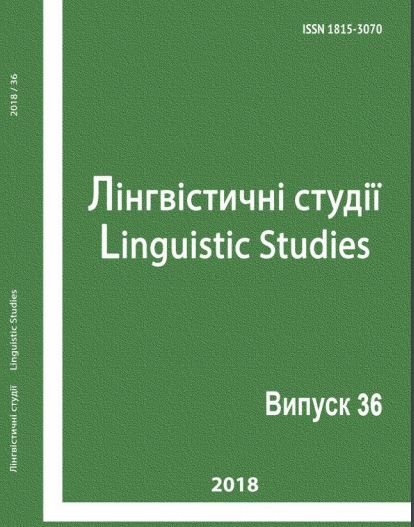Linguistic Semantics within Interval Philosophy.
DOI:
https://doi.org/10.31558/1815-3070.2018.36.1Keywords:
Linguistic Semantics, interval philosophy, model, postulate, multidimensionality, subject and object of cognitionAbstract
The author proceeds from the inadequacy of language semantics modeling, advocated in Linguistic Semantics theory. It is underlined that in modern linguistic studies prevails a selective (unidimensional) approach towards modeling linguistic meaning as a conceptual entity verbalized in a language sign. The opinion is advanced to model the contents of a linguistic item or of a class of linguistic items through a sampling of a multidimensional situation concept that represents the dynamics of the world of discourse (a certain situation or its fragment) conceptualization from different vantage points. For Linguistic Semantic methodology such an approach provides for using the principles of Interval Philosophy that ascertains the features of an object of investigation from the perspective of a researcher’s chosen epistemological position.References
Alpatov, Vladimir. Istoriya lingvisticheskikh ucheniy (History of linguistic studies). Moscow: Yazyki slavyanskoy kul'tury, 2001. Print.
Babich, Babette. “The multidimensionality of hermeneutic phenomenology: From philology through science and technology to theology”. The Multidimensionality of Hermeneutic Phenomenology. Cham: Springer, 2014. xv-xxvi. Print.
Gusserl', Edmund. Kartezianskie razmyshleniya (Cartesian meditations). Sankt-Peterburg: Nauka; Yuventa, 1998. Print.
Lafont, Cristina. “Continental philosophy of language”. International Encyclopedia of the Social and Behavioral Sciences. Amsterdam: Elsevier, 2015. 790–795. Print.
Lazarev, Feliks. “Filosofiya v kontekste sovremennoy kul'tury: ot plyuralizma k monizmu (Philosophy in the context of modern culture: from pluralism to monism)”. Uchenye zapiski Tavricheskogo natsional'nogo universiteta (Proceedings of Taurida National Univarsity). 13(52) (2001): 16–28. Web. 30 Apr. 2018.
Lazarev, Feliks. “Ponyatie otnositel'nosti znaniya v interval'noy epistemologii (The notion of knowledge relativity in the interval epistemology)”. Kul'tura narodov Prichernomor'ya (Culture of the Black Sea Coast Peoples). 43 (2002): 270–276. Print.
Lazarev, Feliks, and Bryus Littl. Sovremennaya epistemologiya: dukh i problemy (Modern epistemology: spirit and problems). Simferopol': Tavrida, 1999. Web. 30 Apr. 2018.
Lazarev, Feliks, and Margarita Trifonova. Filosofiya (Philosophy). Simferopol': Sonat, 1999. Print.
Lazarev, Feliks, and Sergey Lebedev. “Filosofskaya refleksiya: sushchnost', formy, tipy (Philosophical reflection: essence, forms, types)”. Voprosy filosofii i psikhologii (Issues of Philosophy and Psychology). 3(1) (2015): 4–16. Print.
Losev, Aleksey. “Veshch' i imya (Thing and name)”. Bytie – imya – kosmos (Being – name – space). Moscow: Mysl', 1993. Print.
Ludwig, David. “Letting Go of “Natural Kind”. Toward a Multidimensional Framework of Non-Arbitrary Classification”. Philosophy of Science. 85(1) (2018): 31–52. Print.
Nikitina, Serafima. Semanticheskiy analiz yazyka nauki (Semantic analysis of science language). Moscow: Nauka, 1987. Print.
Novoselov, Mikhail. Logika abstraktsiy (Logic of abstractions). Moscow: Institut filosofii RAN, 2000. Print.
Zhuge, Hai. Multi-Dimensional Summarization in Cyber-Physical Society. Amsterdam: Elsevier, 2016. Print.


